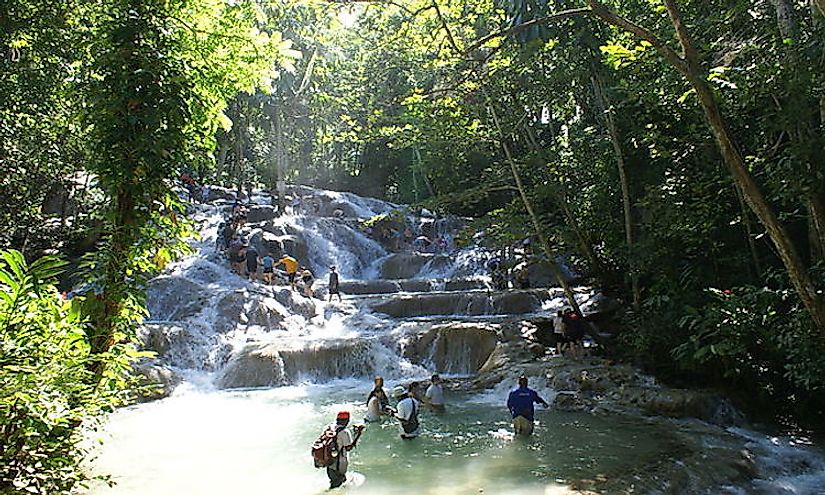Dunn's River Falls, Jamaica

5. Location
Dunn’s River Falls is located in Jamaica near the town of Ocho Rios in Saint Ann Parish. The Parish, the largest in Jamaica, lies on the north side of this island nation. The town and the waterfall are popular tourist destinations. The waterfall is nearly 200 feet tall and runs a 600-foot distance over natural rock terraces. Among these terraces are several small pools of water. At the end of its course, Dunn’s River Falls empties into the Caribbean Sea
4. Historical Role
The Saint Ann Parish area is believed to have been inhabited as early as 600 AD by the indigenous Arawak people. This makes the area around the Dunn’s River Falls the oldest settlement on the island. Just under 20 miles away is the site where Christopher Columbus landed in 1494, now called Discovery Bay. The Spanish established their first colony in present-day Seville and nearby St. Ann’s Bay became the capital of Jamaica during that time.
Local accounts from the area suggest that the Spanish called Dunn’s River Falls and its surroundings “Las Chorreras,” which means “running waters.”The waterfall and nearby town, Ocho Rios, were also the site of the Battle of Las Chorreras which occurred between the Spanish and the British in 1657. The British defeated the Spanish and took control of the island, this area in particular later became part of the Belmont property. In 1972, the Jamaican government purchased the Belmont property in order to create the park that stands here today.
3. Habitat And Biodiversity

Jamaica has the fifth highest level of endemic biodiversity of any island around the world and is the most biodiverse of any island in the Caribbean. This fact is no exception around Dunn’s River Falls. The surrounding tropical plants include crotons, palm trees, orchids, bamboo, and ferns (to name just a few). The area is rich in forests, mountains, and watersheds. The watersheds near the park are considered some of the least degraded in the country. In total, Jamaica has over 3,300 vascular plant species, 600 fern species, 116 butterfly species, and 256 bird species (30 of which are endemic).
2. Tourism And Tourist Activities

Visitors to Ocho Rios and Dunn’s River Falls can participate in a wide range of activities. One of the most popular of these is climbing the falls with a guide. Once people reach the end, they are given the opportunity to swim and relax in the pools at the top. Another popular place to visit is the beach where Dunn’s River flows into the Caribbean. Many people choose to run along the beach while others decide to lay back and sunbathe.
1. Threats And Conservation
Some of the biggest threats to the natural areas of Jamaica, including Dunn’s River Falls, are deforestation, invasive species, development, population growth, habitat fragmentation, and climate change. All of these factors lead to one thing: habitat loss and degradation. These factors result in such drastic changes to the ecosystems of the local flora and fauna that they are not able to adapt. These plants and animals are being pushed into smaller and smaller areas with decreased chance of survival. There are already 5 mammals, 10 birds, 5 reptiles, and 6 amphibians on the IUCN’s Red List of Threatened Species.
The government is actively pursuing conservation efforts of the country’s environment, however, through policies and plans. Development and timber activities require permits that allow for monitoring of any urban or industry expansion efforts. Additionally, the government has signed several international agreements that outline regulations and sustainable approaches to trade, protected area management, wildlife conservation, and biodiversity preservation. Unfortunately, due to budgetary constraints, many areas lack the appropriate enforcement of these plans and regulations.











